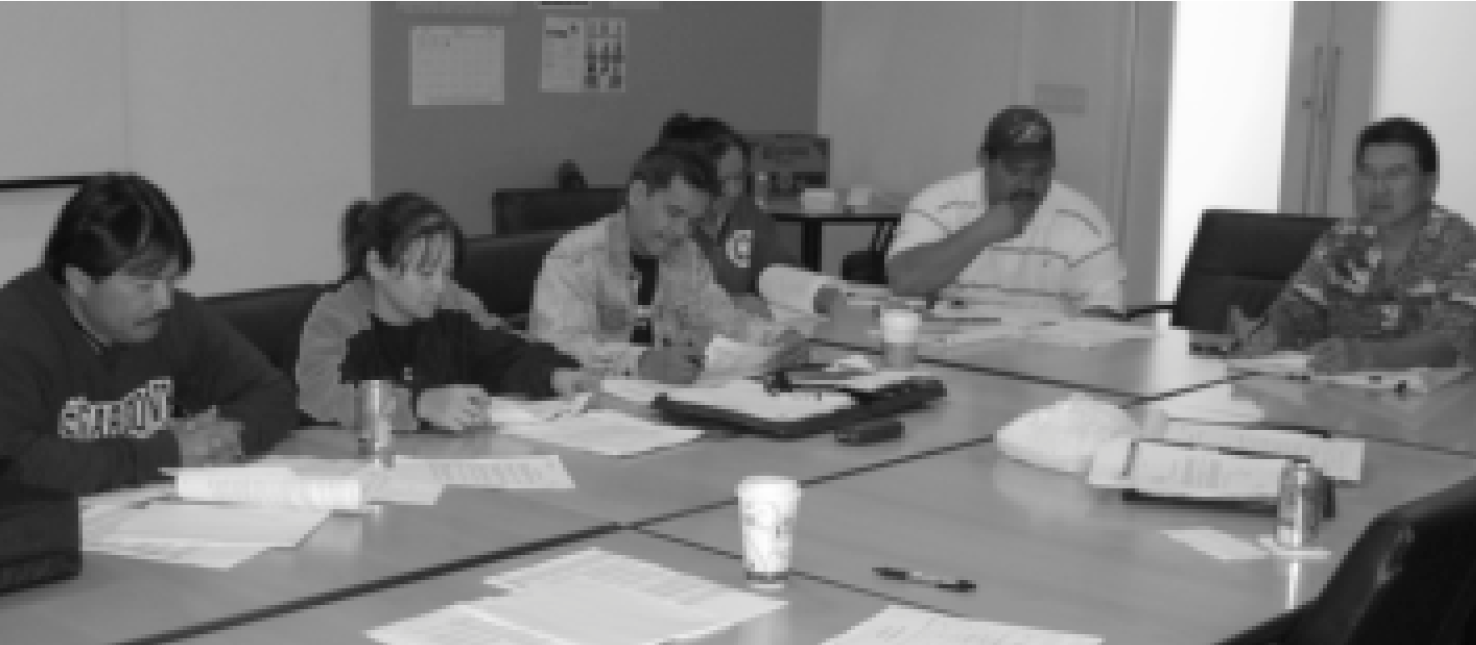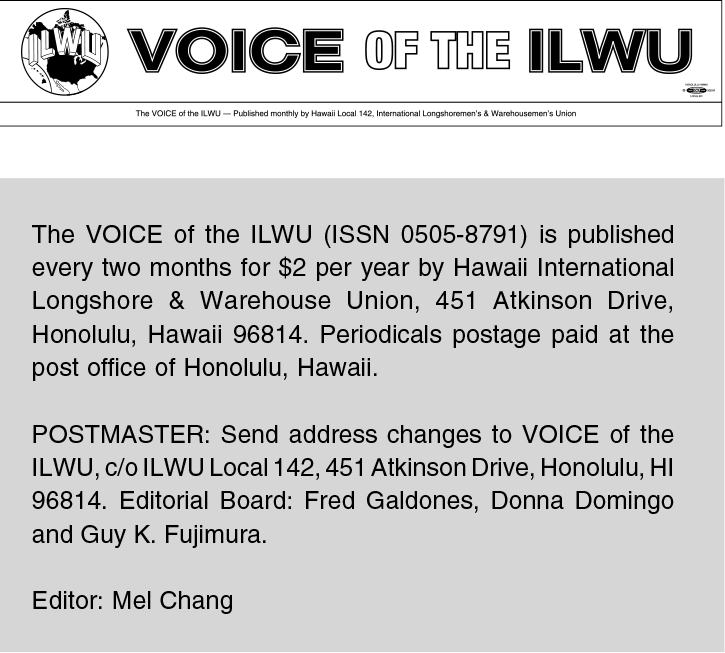The ILWU International Executive Board endorsed Senator Barack Obama for President on February 28, concluding that he is “the best candidate for our union and for working families.”
Board members made their decision after an extensive process that involved interviewing the major campaigns and examining their positions on key issues that will impact ILWU members in the coming years. Republican Presidential candidates were not interviewed because they failed to address the key issues below, including:
Bringing our troops home safely from Iraq. Ending the war continues to be a concern of Executive Board members, rank-and-file union members, and the general public. Obama’s record on the Iraq war was an important factor in winning the ILWU endorsement.
“By speaking out early against the war, Obama took leadership at a time when others were reluctant,” said International President McEllrath.
Supporting the rights of workers to join unions without employer threats is a priority. Obama pledged to support the “Employee Free Choice Act” that would create new rules to make it easier for workers to join a union. But actually passing the “Employee Free Choice Act” in Congress will require a huge effort from all union members – and a President who will make it a top priority and help deliver enough votes for the proposal to become law.
Making quality, affordable health care available to all Americans is another pledge that will require some heavy lifting from union members in order to become law. All major Presidential candidates declined to support the single-payer approach favored by the ILWU. Obama has pledged to sign a universal health care bill by the end of his first term.
Re-thinking “free trade” agreements has been a concern of the ILWU since the first fight over NAFTA.
While Obama, has expressed some troubling “free trade” views in the past, his recent criticism of NAFTA and his commitment to oppose the Central American Free Trade Agreement (CAFTA) made an important difference.
“No candidate is perfect on all the issues, but America’s working families are ready for someone with a fresh approach who will put people first and hold corporations more accountable,” said ILWU International President Bob McEllrath. “Obama met with us, listened to our concerns, and we think he’ll do the best job on the issues that matter to working families.”

Weyerhaeuser unit officers meet with Oahu Division Director Dave Mori (extreme right) as they prepare to negotiate with the company over the closure. From left to right: Stanley Wilson, Cynthia Kurata, Alexander Redoble, Charlotte Coronel, and Sililo Pale.
Weyerhaeuser closes Honolulu plan
HONOLULU—Weyerhaeuser surprised its workers and the Hawaii community when it unexpectedly announced on March 13 it would close its Honolulu corrugated box plant effective May 12, 2008. The closure affects 85 employees, of which 64 are ILWU members. Many of the workers have been with the company for decades. Twenty ILWU members have more than 20 years seniority with the company.
The box making plant has been in the ILWU family since 1945 when it was set up by the Hawaiian Pineapple Company. The plant was sold to Weyerhaeuser in late 1957. Over the last 50 years, Weyerhaeuser workers have negotiated good union contracts with a solid package of benefits and high wages.
Weyerhaeuser’s decision to close and dismantle the plant came as a surprise as the box making business has been profitable. Overall, Weyerhaeuser’s container and packaging businesses have been doing well, and helped contribute to the company’s net earnings of $790 million for 2007, an increase over its 2006 earnings of $507 million. The downturn in the US housing market did cause major losses in the company’s wood products and housing divisions in the 4th quarter of 2007. The downturn is expected to continue in the first half of 2008.
The union contract with Weyerhaeuser does provide a severance benefit of 9 days times each year of service. This benefit alone adds up to over $1.3 million and gives employees some needed income as they look for new employment.

Global trends impact Molokai Ranch
KAUNAKAKAI—About 92 ILWU members lost their jobs when Molokai Ranch shut down all its operations on the Island at the end of March 2008. The ILWU represented 80 workers at the Molokai Lodge, Kaupoa Beach Village, and 12 workers at the Kaluakoi Golf Course. Including management and other employees, a total of 120 people were affected by the closure.
The company was a major employer on the Island and owns 60,000 acres or 40 percent of the Island of Molokai. The sudden loss of 120 jobs on an island with a workforce of only 2,500 will have a serious impact on the entire community.
The company blamed the closure on political road blocks and opposition to its development plans, including a project to build and sell 200 luxury housing units on its La’au Point property. But the fate of the Ranch was tied to global economic forces and the extreme makeover of parent company Brierley Investments Ltd, renamed BIL International in 2001, and now doing business as GuocoLeisure.
Malayasian billionnaire Quek Leng Chan gained control as the chairman of the board of directors of BIL in 2001, after the company’s founder Sir Ron Brierley of New Zealand retired. At that time, the company was based in New Zealand. Within two years, a series of retirements, resignations, and appointments of new board members from Singapore and Hong Kong, put Quek in firm command of the company.
Quek moved the company’s headquarters to Singapore, sold off underperforming assets, and focused on development projects in Singapore and China and the operation of its London hotels.
In mid 2007, Quek also took on the job of chief executive officer when the company’s CEO, Arun Amarsi, retired. Quek renamed the company to GuocoLeisure.
With the collapse of the US housing market and subprime loan crisis, the company decided to cut its losses on Molokai and focus its attention elsewhere.
Molokai Ranch would have to wait for better times.
In 2007 Forbes magazine listed Quek Leng Chan as the 382nd richest person in the world with a net worth of about $3 billion.
Molokai investment
Brierley Investments purchased the Molokai Ranch property from the Cooke family in 1989 for about $50 million. By 1998, Brierley had invested another $173 million developing the Molokai property, building an eco-tourism, industrial park, infrastructure, sprucing up the town of Maunaloa, and building affordable housing. The company was losing $10 million a year on revenue of $5 million, but took the long view that the property would eventually be profitable in 10 or 20 years. The property is presently valued at around $200 million.

